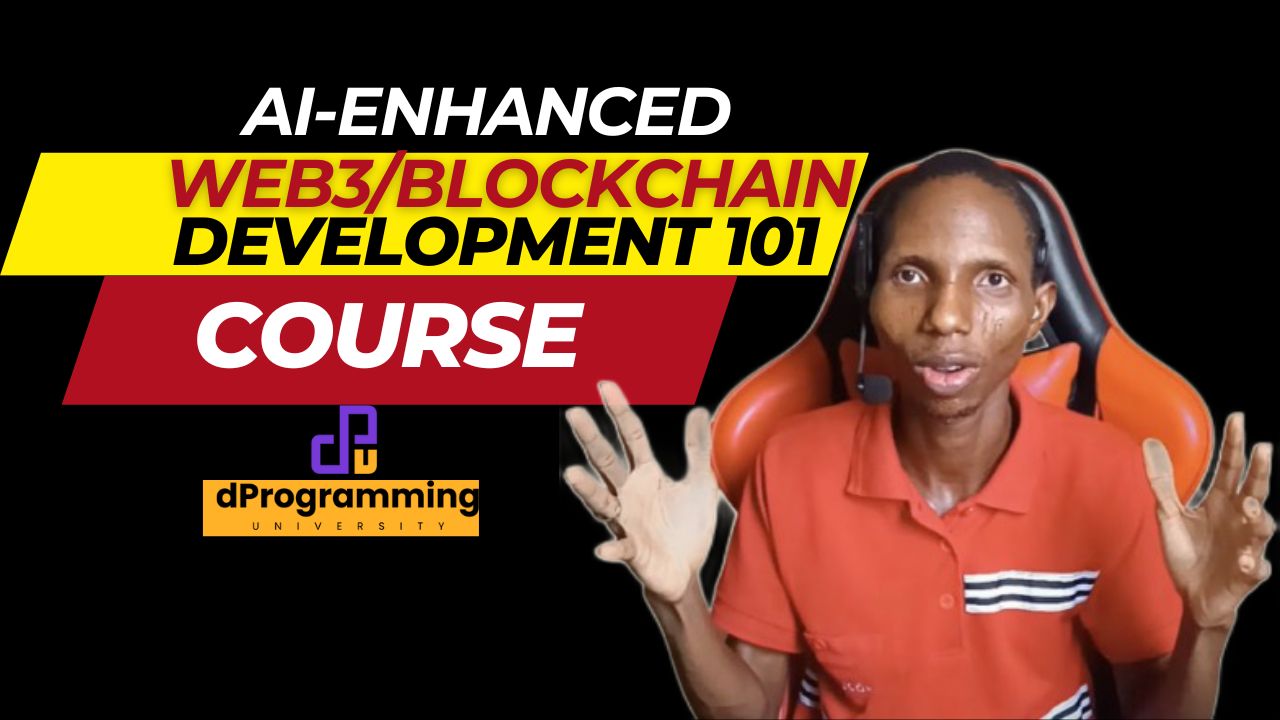Course Description:
Welcome to “AI-Enhanced Web3/Blockchain Development 101 Course: From Beginner to Blockchain Developer Empowered by AI Tools” an in-depth introductory course designed for those new to the web3 landscape. This course is tailored to empower you with the knowledge and tools to understand and participate in the world of decentralized applications (dApps), smart contracts, blockchain technology and AI-driven Web3 development.
You will embark on a journey to discover web3, blockchain platforms like Ethereum and Solana, and the essential programming language of blockchain, Solidity. This course guides you step-by-step through setting up your development environment, delving deep into the intricacies of wallets, dApps, Git, and GitHub, and unlocking the potential of AI in blockchain development.
No prior coding experience? No problem. This course is created for absolute beginners and aims to bridge the gap between traditional web development (Web2 development) and the new, exciting world of AI-integrated web3 development.
DISCLOSURE:
We may hold, invest, trade or receive rewards/grants/bounty/tokens from reviewed/discussed web3 projects/affiliates (before, during or after this content was published).
DISCLAIMER:
All our contents at dProgramming University are for educational purposes only and do not constitute financial, trading, investment or development advice.
Please always do your own research (DYOR).
By using or following the whole or part of this content, you agree that we are not liable for any losses that you may suffer thereafter.
Why Choose This Course?
- AI-Enabled Learning: Gain insights into how AI tools can revolutionize blockchain development. 10x your productivity with AI tools as a web3 developer.
- Hands-on Approach: Learn by setting up real-world development environments and incorporating AI tools and techniques.
- Comprehensive Coverage: From understanding blockchain basics to preparing for AI-enhanced dApp development.
- Beginner-Friendly: No prior experience in coding, blockchain or AI is required.
- Preparation for Advanced Learning: Lay the groundwork for future courses in web3 frontend and smart contract AI-augmented web3 development.
- Community and Support: Engage with a community of learners and receive guidance from experienced web3 developers.
- Certification: Upon successful completion of the course, you will receive a certificate of completion, which represents your skills and dedication.
Who Should Take This Course?
- Anyone curious about blockchain, dApps, and web3 development.
- Traditional web developers (Web2 developers) seeking to transition into the AI-enhanced blockchain space.
- Non-developers, Entrepreneurs and enthusiasts who wish to understand the technical aspects of web3 projects and the synergy of web3 and AI.
- Anyone that is interested in the future of decentralized technology/Blockchain.
Prerequisites:
- An interest in web3 technology, AI, and their transformative applications.
- A willingness to learn new concepts in a rapidly evolving tech landscape.
- Access to a computer and the internet for practical exercises and development setup
- Enthusiasm to learn about decentralized platforms and the opportunities in the web3 ecosystem.
- Familiarity with blockchain technology is a plus but not required.
Certification:
Complete the course and tackle the practical exercises to earn a certificate of completion.
This certificate is not just a testament to your dedication but also a step forward in your journey as a web3 developer.
Enroll Now!
Do not miss this chance to be at the forefront of the web3 revolution.
Enrol now and start your journey from a beginner to an AI-enhanced blockchain developer with “AI-Enhanced Web3/Blockchain Development 101 Course: From Beginner to Blockchain Developer”!
Course Outline:
This course outline is structured to guide and provide a roadmap through the essential concepts and tools for web3 development, ensuring you are well-prepared for the exciting world of blockchain technology.
